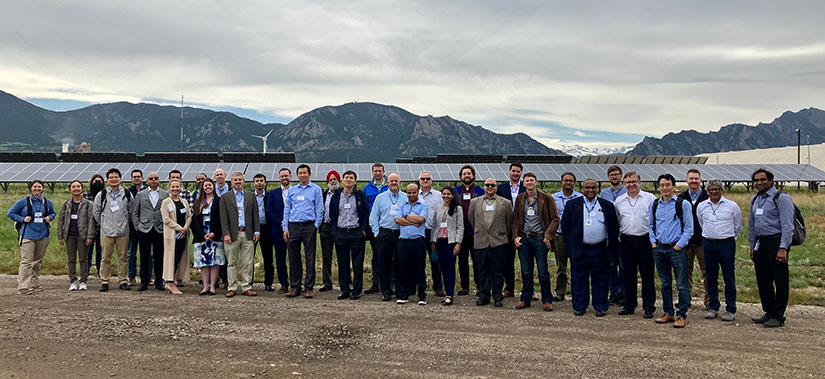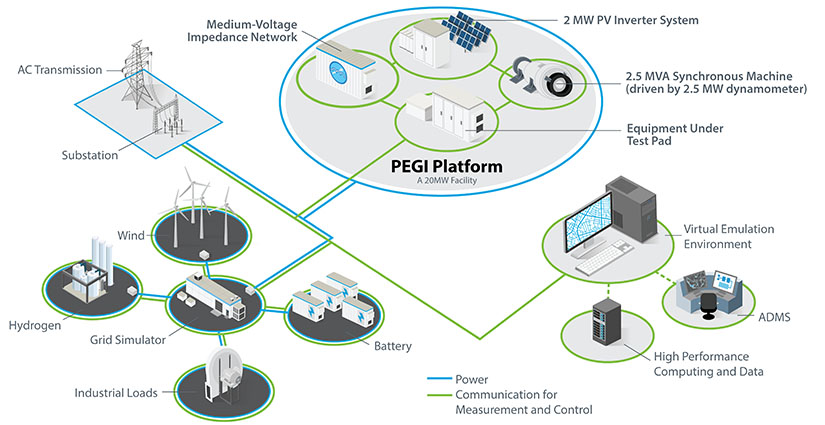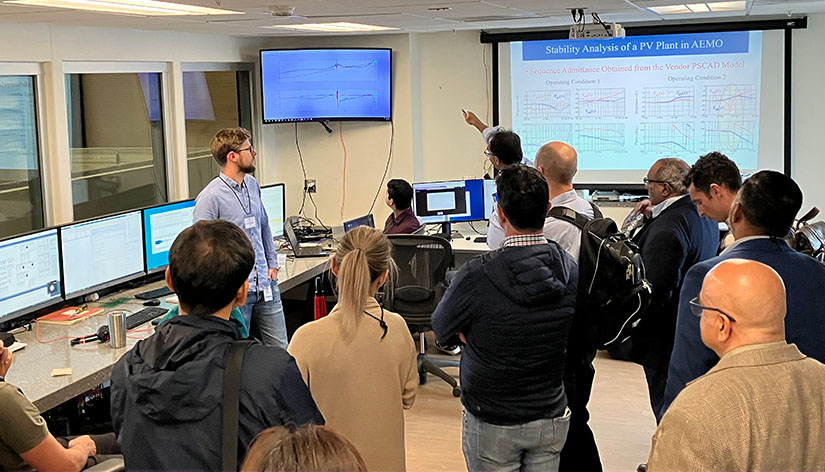Power Electronics Workshop Invites Industry To Collaborate Around Grid Stability Challenges

Growth in renewable energy has initiated an era of power electronics for the grid, and engineers are grappling with the change. That is why the National Renewable Energy Laboratory (NREL) hosted the Power Electronics Grid Interface (PEGI) industry workshop in late May, where attendees from utilities, grid operators, equipment manufacturers, and project developers visited NREL's renowned research campus to share ideas and see the latest capabilities for power electronic integration.
The workshop introduced attendees to the Power Electronic Grid Interface (PEGI) research platform, which can help industry to develop and validate solutions, build experience with new technologies, and make decisions about how the grid will operate in the future. "The PEGI platform has been specifically designed to evaluate, using hardware, the biggest industry concerns related to high inverter-based resource grid operation," said Barry Mather, manager of the NREL's Power Systems Engineering Center.
Following introductory talks by NREL and U.S. Department of Energy (DOE) leadership, participants heard respective industry challenges of integrating more inverter-based devices. Because the United States features an uneven renewable energy landscape, hearing these perspectives helped to formulate a big-picture view of the challenges that industry faces.
For utilities and system operators, inverter-based systems are becoming an ever-larger constituent of the grid. Lacking validated tools and models to coordinate, control, and evaluate power electronics on the grid, these inverters are generally complicating grid dynamics, sometimes even leading to undesired stability issues. These issues affect the entire industry, as equipment manufacturers seek to design device controls that minimize unwanted interactions, project developers strive for streamlined and safe interconnections, and utilities are set with operating a reliable grid.
NREL researchers, with ardent support from DOE, have built up multiple toolsets and evaluation capabilities to develop solutions and transfer knowledge to industry. NREL researchers presented an example of such industry support through recent work in Hawaii, where grid-forming controls and advanced system analysis are showing the way for operating a stable renewable power system.
"It was exciting to present our Hawaii research results to industry experts and discuss how techniques like grid-forming inverter controls and advanced analysis could be applied to mainland power systems facing similar challenges from very high levels of inverter-based generation like solar and wind," said Andy Hoke, a principal electrical engineer in NREL's Power Systems Engineering Center.
The NREL team has also designed a framework for utilities to analyze and schedule energy systems at different timescales. This tool is a welcome addition to the arsenal of tools for utilities to manage high levels of renewable energy and is one of several capabilities that NREL presented at the May workshop.
Power Stability Analysis With the PEGI Platform
At the end of the first day, attendees toured NREL's Flatirons Campus, where commercial wind, solar, and other grid hardware is located. In this environment, PEGI can be equipped to replicate any power system at a temporal fidelity appropriate for power electronics and is specifically designed to evaluate the operation of high inverter-based resource grids. From the campus's control room, attendees viewed a live evaluation of the electrical stability of a 2-megavolt-ampere solar inverter and 2.5-megavolt-ampere synchronous generator.

Using the Grid Impedance Scan Tool, NREL engineers presented live impedance scan measurements of an on-site solar inverter and a synchronous machine, which are primary components of the PEGI platform. The scans show how the generators interact electrically with a grid network, indicating where problematic oscillations are likely to occur and how to prevent them. This tool is essential for industry, which is currently challenged by diverse and unstandardized renewable energy devices that can cause poorly characterized interactions on the grid.

Collaborating To Overcome Stability Concerns
On the second day, attendees learned about more of NREL's grid stability efforts—including the UNIFI consortium and customized inverter controls—before breaking out into group sessions to identify specific research areas and projects that should be addressed using the PEGI Platform.
From the breakout discussions, the attendees determined that the PEGI platform can be especially useful in helping industry define performance standards for inverter-based resources and for validating scenarios in which inverters provide grid-forming or blackstart support. The attendees also expressed keen interest in collaborating with NREL in power electronics research and technology validation with the PEGI platform.
NREL is currently seeking industry partners for the first few research projects that will use the PEGI Platform to address current industry challenges. Please contact PEGI Platform Lead Barry Mather if you have an interest in how the PEGI Platform can be used to answer your specific challenges.
Learn about NREL's Advanced Research on Integrated Energy Systems.
Last Updated Jan. 22, 2026
